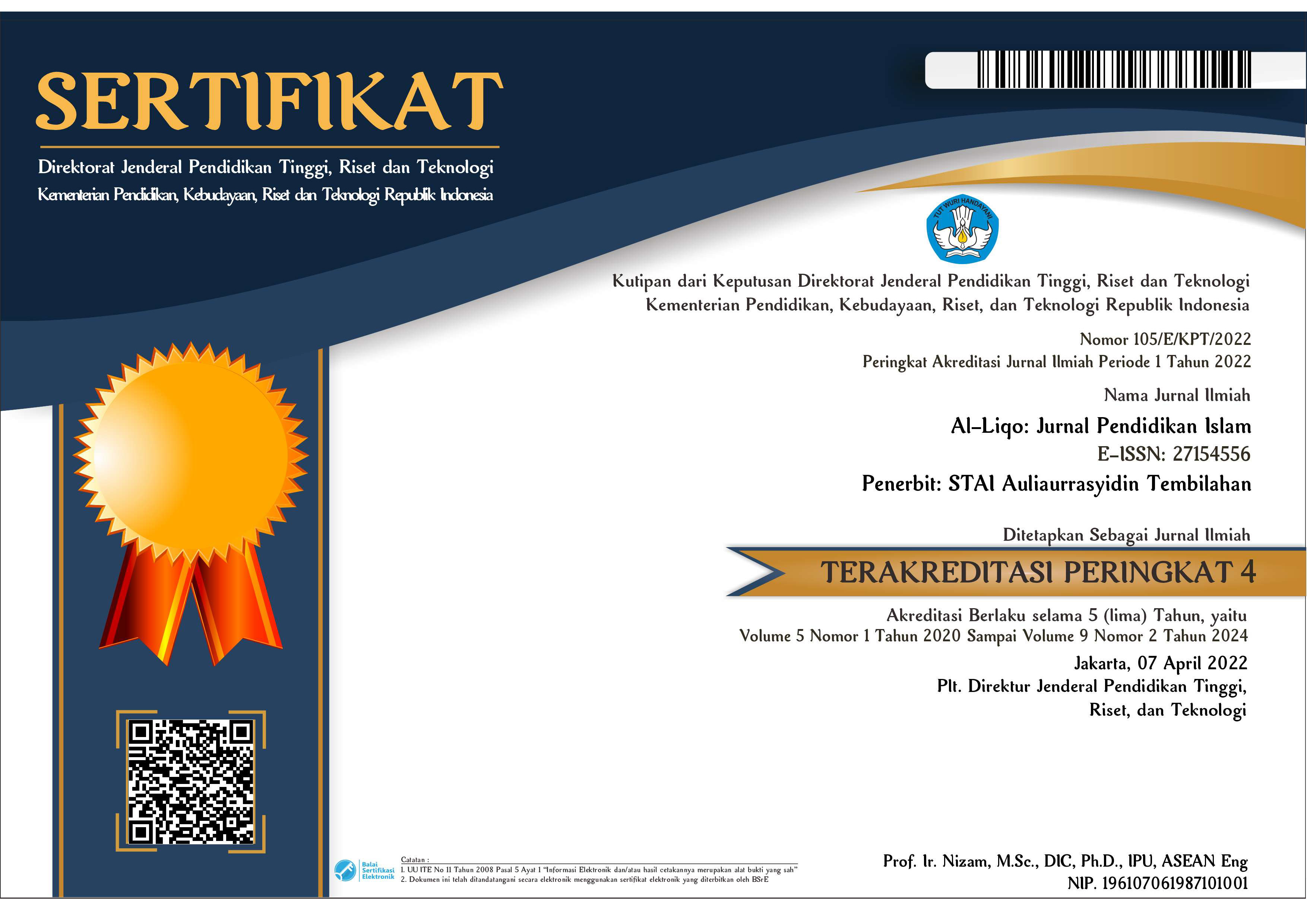Teori Belajar Sosial dalam Perspektif Hadits-Hadits Akidah Akhlak
DOI:
https://doi.org/10.46963/alliqo.v9i1.1107Keywords:
Learning, Islam, SocialAbstract
Islam is the perfect religion, the Messenger of Allah is the most noble Messenger, so all of his teachings and his entire life describe this glory, including in carrying out his duties as an Apostle, reciting the Qur'an, teaching it and guiding his people to purify their souls, so that all learning theories are true. has been portrayed and exemplified by the Prophet SAW including social learning theory. Because in this short article several hadiths and histories are mentioned as examples of the form of social learning theory even though it is limited to hadith hadiths in the chapter on faith and morals, even though in fact there are many examples of social learning in theory in the sunnah of the Prophet SAW with his companions who always get outpourings knowledge. Social learning theory can be seen from the observations and observations, retention, reproduction and motivation. If the above is realized, then the social learning theory materializes. Hopefully, from the examples of the Prophet's hadiths, social learning theory can be additional knowledge and belief in the perfection of Islamic teachings.
Downloads
References
Abdul, (2009). Teori Belajar dan Pembelajaran. Medan: Unimed Pres.
Abu Ahmadi, 2004. Psikologi Belajar. Jakarta: Rineka Cipta
Al-Baihaqiy, Sunan al-Kubra, cet III 2003 beirut, Dar alkutub al-ilmiyyah
As-Sa’diy, Abdurrahman Bin Nashir, Tafsir As-sa’diy, cet II tahun 2002 Riyadh: Darussalam.
Baharuddin, (2015). Teori Belajar dan Pembelajaran, Yogyakarta, ArRuzz Media.
Dahar, RatnaWilis. (2011). Teori-Teori Belajar dan Pembelajaran. Jakarta: Erlangga. Hamid,
Hanbal, Ahmad, Musnad, Cet I, Tahqiq Syuaib al-Arnauth, Muassasah Arrisalah
Ibnu Abi Syaibah. 1409. Al Mushannaf. Edited by Kamal Yusuf Al Hut. 1st ed. Riyadh: Maktabah Ar-Rusyd.
Imam Bukhari. 1981. Shahih Al- Bukhari, Jilid. III. Edited by Muhammad Fuad Abdul Baaqiy. Riyadh: Baitul Afkar Ad Dauliyyah.
Muhammad ibn ahmad al-qurthubi. 1984. Al-Jami’ Liahkamil Qur’an. Edited by Ahmad Albarduni. Ke 2. Cairo: Darul Kutub Al-Mishriyah.
Ibnukatsir, Tafsir alqur’an al azhim, cet ke II almaktabah al ashriyyah, Beirut.
Khadijah, (2013). Belajar dan Pembelajaran. Medan: Citapustaka Media.
Sani, Ridwan Abdullah. (2013). Inovasi Pembelajaran. Jakarta: BumiAksara
Sanjaya, Wina. (2013). Kurikulum dan Pembelajaran. Jakarta: Kencana Prenada Media Group.
Schunk, Dale. H. (2012). Learning Theories. Yogyakarta: Pustaka Pelajar
Downloads
Published
Issue
Section
License
Copyright (c) 2024 Zainal Arifin, Abdul Hayyie Al Kattani, Akhmad Alim, Abas Mansur Tamam, Imas Kania Rahman

This work is licensed under a Creative Commons Attribution-ShareAlike 4.0 International License.
Authors who publish with this journal agree to the following terms:
1. Copyright on any article is retained by the author(s).
2. The author grants the journal, right of first publication with the work simultaneously licensed under a Creative Commons Attribution shareAlike 4.0 International License that allows others to share the work with an acknowledgment of the work’s authorship and initial publication in this journal.
3. Authors are able to enter into separate, additional contractual arrangements for the non-exclusive distribution of the journal’s published version of the work (e.g., post it to an institutional repository or publish it in a book), with an acknowledgment of its initial publication in this journal.
4. Authors are permitted and encouraged to post their work online (e.g., in institutional repositories or on their website) prior to and during the submission process, as it can lead to productive exchanges, as well as earlier and greater citation of published work.
5. The article and any associated published material is distributed under the Creative Commons Attribution-ShareAlike 4.0 International License







2.png)



